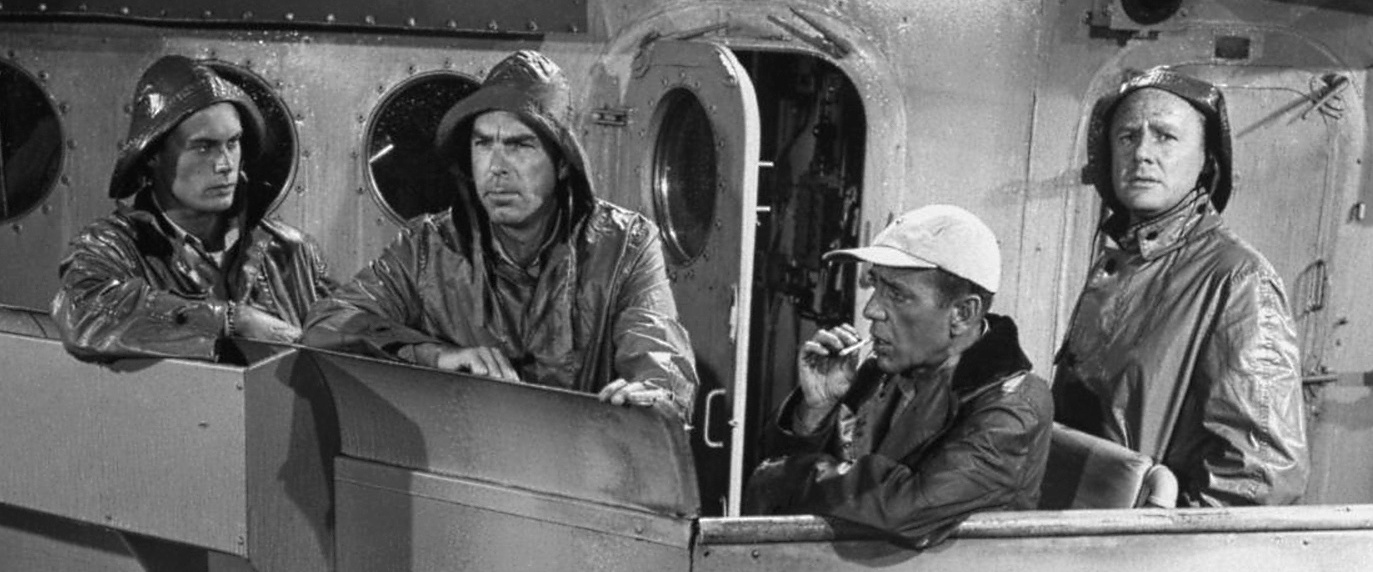
|

While this assertion is outrageous, it should not be dismissed. The Navy is like any large organization – it is susceptible to bureaucracy and all the life-draining attributes thereof. What is a lowly midshipman to do in the face of this all-too-human genius/idiot reality?
Know your enemy.
Here is a litany of observations about the whys and wherefores of large organizations and bureaucracy.
You are part of the world's most feared and trusted force.
For the mission's sake, our country's sake, and the sake of the men who
carried the Division's colors in past battles - who fought for life and
never lost their nerve - carry out your mission and keep your honor clean.
Demonstrate to the world there is "no better friend, no worse enemy" than
a U.S. Marine.
[MajGen James Mattis'
"Message
to All Hands" on the eve of war, March 2003]
Aside. Are "fight" and "happy" mutually exclusive? Should a
Christian soldier take pleasure in killing people? A World
Magazine editorial [26 February 2005] offered the following
interpretation of a Martin Luther essay ... God has appointed earthly
rulers to restrain sin and has given them the authority to "bear
the sword". The soldier, acting under a lawful chain of command
under the authority of the state, therefore has a legitimate calling
from God, who himself acts through human vocations. The Christian
soldier, living out his faith in his vocation, loves and serves his
neighbors by defending and protecting them. When eternal standards
of morality remain intact, those who answer the call to the Christian
vocation of soldier may fight "in good conscience". Before God,
soldiers should be humble and repentant. But before the enemy, they
should "smite them with a confident and untroubled spirit". Soldiers,
Luther says, should go "forward with joy!" As is other vocations, so
in the military, there is nothing wrong with enjoying one's work.
Fight with a happy heart
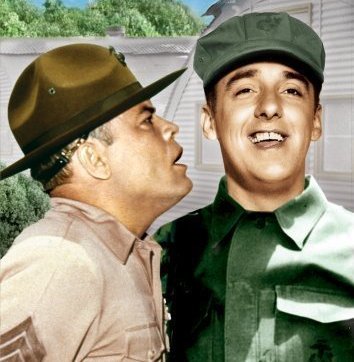
The Gomer Pyle and Forrest Gump characters were without guile.
Their ingenuousness was a powerful asset – it allowed each to
flywheel through
hardships that would cause more worldly-wise persons to take offense
or be set back with anxiety. Their unaffected demeanors was
the cornerstone of an indefatigable spirit. They could experience
striking adversity, and remain true to their best selves. Pyle's
ever-present smile and Gump's unflappable stoicism are excellent
models for anyone staring down a seemingly inexorable bureaucracy.
Fight with a happy heart and strong spirit.
Be the hunter, not the hunted.
Engage your brain before you engage your weapon.
Share your courage with each other.
Keep faith in your comrades on your left and right and Marine Air overhead. Be a gym rat

|
Hang around. Be a fixture. Be available when "opportunity knocks".
Ask questions. Be curious.
Take the road less traveled.
Get your head out of the cockpit.
Keep your head on a swivel.
Show an interest in the interests of others.
Develop an insatiable appetite for many and varied experiences.
Stop and stare. Smell the roses. Don't assume the first answer, the school solution, or the gatekeeper's edict is the only answer. Explore alternatives, find other decision makers, find a side door, work the problem backwards, transpose the problem to another domain, invent a new paradigm. |
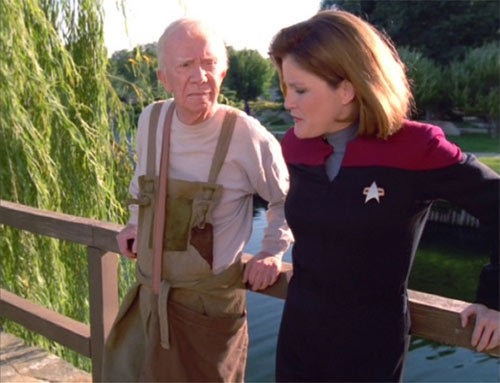 One definition for the term "food chain" is: a hierarchy based on power or
importance. Each of us exist in multiple food chains: your family, your
social group back home, the Navy, the Brigade, the Yard. The latter is
differentiated from the former to make the point that while you might have
zero power in the Brigade, you have unlimited power
in the Yard. You can
choose to be a neighbor to visitors, alumni, and employees of the
Naval Academy. In some sense, you are the home team, and they are the
guests. Never pass up an opportunity to be a blessing – the
greater blessing will routinely be yours.
One definition for the term "food chain" is: a hierarchy based on power or
importance. Each of us exist in multiple food chains: your family, your
social group back home, the Navy, the Brigade, the Yard. The latter is
differentiated from the former to make the point that while you might have
zero power in the Brigade, you have unlimited power
in the Yard. You can
choose to be a neighbor to visitors, alumni, and employees of the
Naval Academy. In some sense, you are the home team, and they are the
guests. Never pass up an opportunity to be a blessing – the
greater blessing will routinely be yours.
An Air Force Academy cadet experienced a life-changing epiphany when he learned their squadron's janitor had won the Medal of Honor in World War II. After that discovery, the entire cadet community was enriched. The cadet wrote a paper years later that advocates: everyone deserves respect, courtesy, and neighborliness.
The Star Trek franchise had a groundskeeper character that surfaced several times when humility and wisdom needed to be explored. Mr. Boothby was the curmudgeonly groundskeeper at Starfleet Academy. He offered helpful advice and kind words to any midshipmen mature enough to value his fellowship. Captain Picard considered Boothby one of the wisest men he ever knew.
Do not neglect to show hospitality to strangers, for thereby some have entertained angels unawares. [Hebrews 13:2]
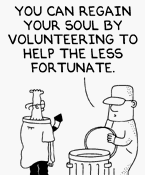
| Scott Adams has a recurring garbageman character that is too wise for his apparent station in life. |
During a visit to a Union warship, a Midshipman was assigned to President Lincoln as an escort. While topside, the Midshipman told Lincoln there were Confederate sharpshooters camped out on a sandbar off the port bow.
Intrigued, Lincoln stood up on the bow, tall hat and all, to get a look. His presence immediately drew musket fire. "Get down, you fool!", cried the Midshipman, grabbing the President's arm and pulling him below the rail. Once safe, the Midshipman realized what he had said to the President of the United States. He waited in dread of disciplinary action.
Lincoln kept him waiting until just before his departure. After thanking the Captain for the visit, he turned to the Midshipman with a wink, and said: "Mister, I'm glad to know that Midshipmen in our Navy know how to speak to a civilian."
During World War II, Admiral Nimitz was in a plane that had crashed, and found himself caught in the middle of sailors swarming to the scene to rescue the wounded. Finally, an exasperated 18-year old crewman yelled, "Commander, if you would only get the hell out of the way, maybe we could get something done." When the crewman realized he had just chewed out a four star admiral, he tried to apologize. But Nimitz's response was: "Stick to your guns, sailor, you were quite right."
This kind of resourcefulness, or tenacity, or maybe even hubris is what distinguishes movers and makers from spectators and takers.
"We will either find a way, or make one." [Hannibal]
In the Star Trek series, there is a Starfleet training exercise called the Kobayashi Maru. It is a no-win scenario designed to test the fortitude and character of cadets. James T. Kirk took the test three times while at Starfleet Academy. Prior to his third attempt, Kirk surreptitiously reprogrammed the simulator so that it was possible to rescue the Kobayashi Maru freighter. He defeated the test, was awarded a commendation for original thinking, and received a field commission.
Early in his career, Admiral Chester Nimitz was tasked with building a submarine base at Pearl Harbor. The problem was that he was given no building material. Then-Lieutenant Commander Nimitz led nighttime raiding parties on other units' surplus materials to get what was needed - and successfully finished the base.
Make it personalDon't assume the boss or the "organization" will think about or sponsor team-building and quality-of-life opportunities. Take matters into your own hands. Invent opportunities to celebrate friends and classmates. Here is a bumper sticker that "mysteriously" appeared on a co-worker's calendar stand.
|
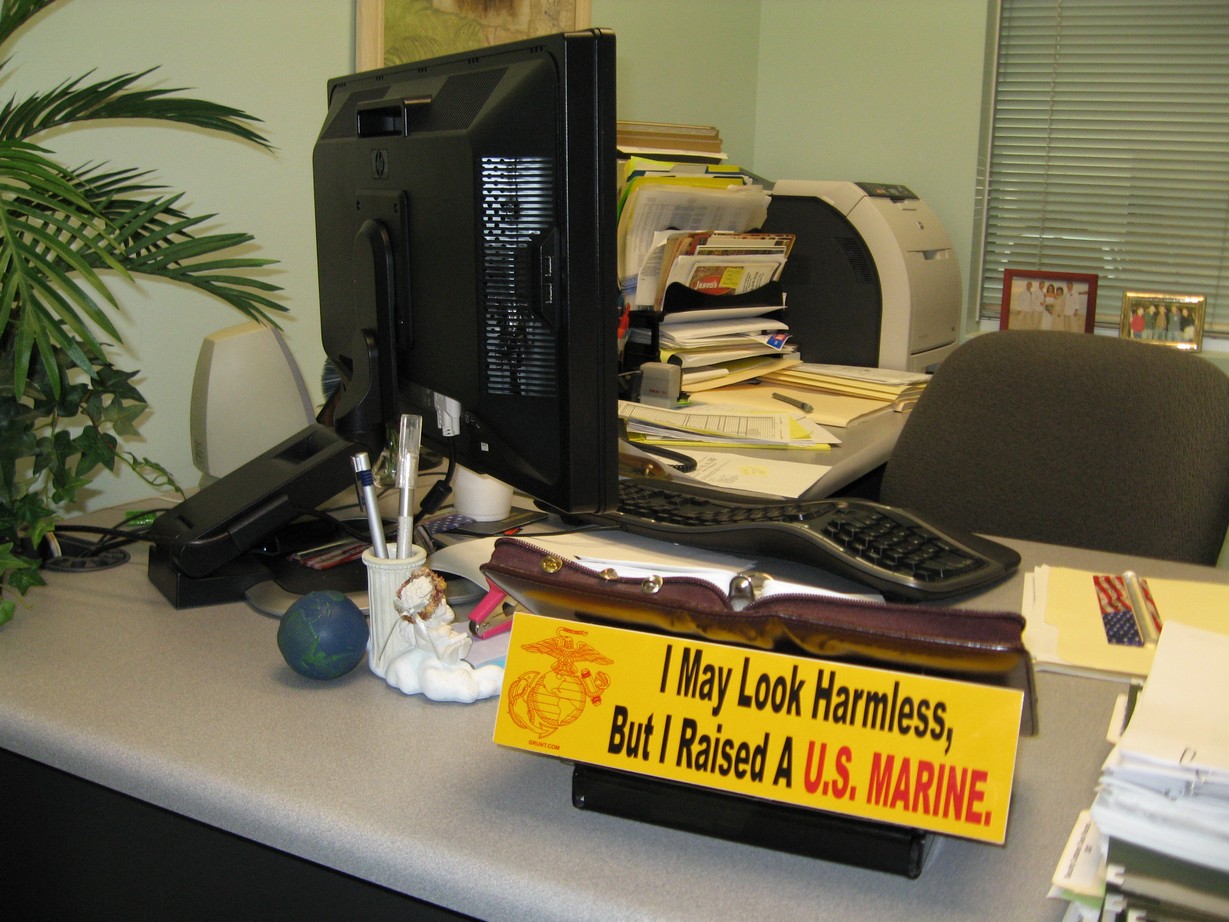
|
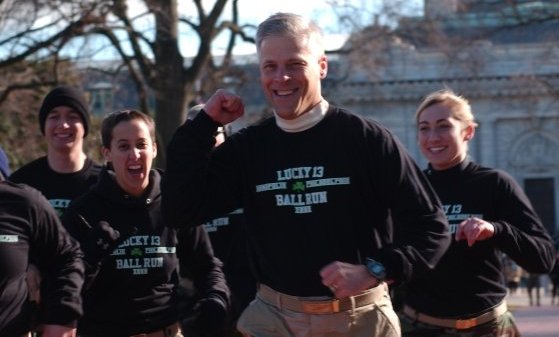 The author Steven Pressfield argues that
tribes might be
humankind's most powerful social invention. Tribes are:
structure, significance, security,
cohesion, fidelity, loyalty, honor, pride,
being a part of something greater than oneself. In a tribe:
you belong,
you know who you are,
your identity is solid and grounded,
you have significance.
Gangs, the Mafia, the Marine Corps are all tribes.
The author Steven Pressfield argues that
tribes might be
humankind's most powerful social invention. Tribes are:
structure, significance, security,
cohesion, fidelity, loyalty, honor, pride,
being a part of something greater than oneself. In a tribe:
you belong,
you know who you are,
your identity is solid and grounded,
you have significance.
Gangs, the Mafia, the Marine Corps are all tribes.Esprit de corps is a tribal values statement – a common spirit that inspires enthusiasm, devotion, and a strong regard for the honor of the group. Individuals at any level of a hierarchy (e.g. the Navy) can contribute to a culture of brotherhood, of esprit de corps.
The annual 13th Company Ball Run is a tribal tradition. All the members of that company (and any designated honorary members) physically run the football from Bancroft Hall to the away stadium hosting the Army-Navy game.
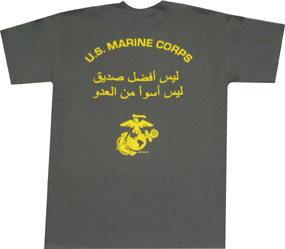
|
This T-shirt is a testimony of tribalism.
"No better friend. No worse enemy." has become part of the
narrative of the United State Marine Corps. The use of
Arabic also demonstrates respect for a culture that particularly
values tribal identity.
|
| When I worked at E-Systems, I wanted to sponsor a team-building activity. I started with the company logo, and designed this stained glass project. I cut all the pieces in advance. We had dinner at our home, and afterward sat on the porch and wrapped each piece with adhesive copper foil. Over the weekend, I soldered the seams and built the frame. The project hung in the front office for many years. |
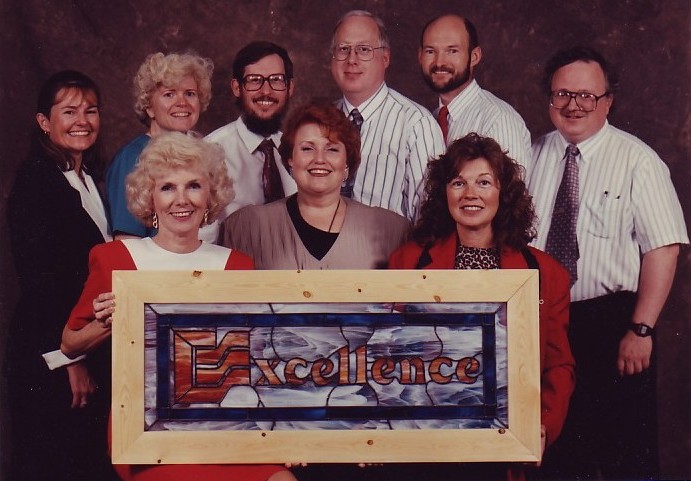
|
The ideas on the next page are largely a continuation of this page.